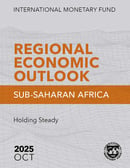This web page provides information in on the activities of the Office, views of the IMF staff, and the relations between Burundi and the IMF. Additional information can be found on Burundi and IMF country page, including official IMF reports and Executive Board documents in English and French that deal with Burundi.
At a Glance
- Current IMF membership: 191 countries
- Burundi joined the Fund in September 28, 1963
- Total Quotas: SDR 154 million
- Outstanding Purchases and Loans: SDR 58.9 million (June 30, 2023)
- Last Article IV Consultation: 2022 Article IV Consultation-Press Release; Staff Report; and Statement by the Executive Director for Burundi (Country Report No. 2022/257, July 29, 2022)
IMF's Work on Burundi
No results found. Either there was an error with the web service or there is no data returned by the web service.
Office Activities
IMF Resident Representative presentation of the Regional Economic Outlook for Sub-Saharan Africa.
On June 3, 2025, the IMF Resident Representative, Samuel Delepierre, presented the Regional Economic Outlook of the IMF for sub-Saharan countries at the Kiriri Garden Hotel. The event was attended by Burundian authorities, development partners and the private sector. [The presentation is in French only]
June 3, 2025
Regional Economic Outlook
October 16, 2025

The outlook for Sub-Saharan Africa is showing resilience, despite a challenging external environment with uneven prospects in commodity prices, still tight borrowing conditions, and a deterioration of the global trade and aid landscape.
Read the Report
Fraudulent Scam Emails Using the Name of the IMF
For more information please see Fraudulent Scam Emails Using the Name of the IMF
Departmental African Paper
 The Departmental African Paper Series covers research on sub-Saharan Africa conducted by International Monetary Fund (IMF) staff, particularly on issues of broad regional or cross-country interest. The views expressed in these papers are those of the author(s) and do not necessarily represent the views of the IMF, its Executive Board, or IMF Management.
The Departmental African Paper Series covers research on sub-Saharan Africa conducted by International Monetary Fund (IMF) staff, particularly on issues of broad regional or cross-country interest. The views expressed in these papers are those of the author(s) and do not necessarily represent the views of the IMF, its Executive Board, or IMF Management.



